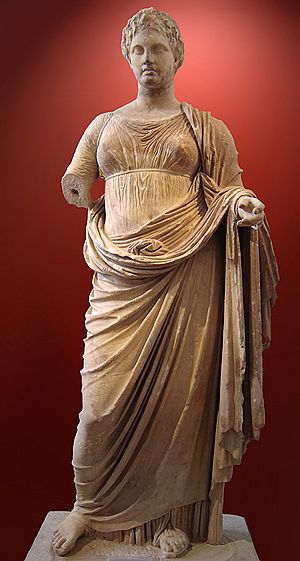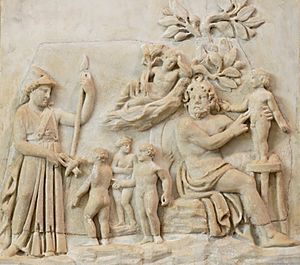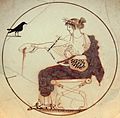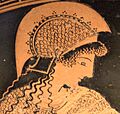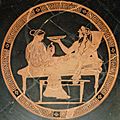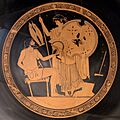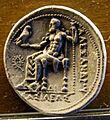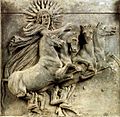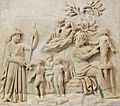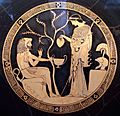List of figures in Greek mythology facts for kids
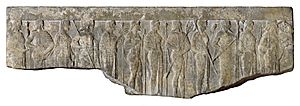
This page lists the amazing gods, goddesses, heroes, and other important figures from Greek mythology. These stories come from ancient Greece. You'll find them sorted into different groups below. The figures who live forever are called immortals. This group includes gods, goddesses, and powerful giants. The figures who do not live forever are called mortals. This group includes brave heroes, wise kings, and strong Amazons. This list does not include creatures like the Minotaur.
Ancient writers like Homer and Hesiod first told us about these figures. The Greeks made many pictures of their gods and goddesses. Temples often held large statues of a god or several gods. These statues might have carvings showing famous myths. You could also see these stories painted on pottery and stamped on coins.
Roman mythology has many of the same figures, but they use different names. For example, the Roman name for Zeus is Jupiter, and for Aphrodite it's Venus.
Contents
- Immortals
- The Olympians: Gods of Mount Olympus
- Primordial Deities: The First Beings
- Titans: The Older Gods
- Giants: Huge and Powerful Beings
- Spirits and Personified Concepts
- Underworld Deities: Rulers of the Dead
- Sea Deities: Gods of the Waters
- Sky Deities: Gods of the Heavens
- Rustic Deities: Gods of Nature and the Countryside
- Agricultural Deities: Gods of Farming and Harvest
- Deified Mortals: Humans Who Became Gods
- Health Deities: Gods of Healing and Well-being
- Other Deities: Various Gods and Spirits
- Mortals
- Images for kids
- Related pages
- See also
Immortals
The Olympians: Gods of Mount Olympus
The most important gods in Greek mythology were the Twelve Olympians. Their home was believed to be at the very top of Mount Olympus. The list of who counted as one of the Twelve sometimes changed. This list includes fourteen gods and goddesses who were often part of this special group in art and poetry. Dionysus was added later. Sometimes, he took the place of Hestia. Hades is usually not counted as an Olympian because he lived in the underworld. However, some writers, like Plato, did include him.
| Deity | What they are known for |
|---|---|
| Aphrodite (pronounced: Ah-fro-DEE-tee)
She is the goddess of love and beauty. She was married to Hephaestus. People imagined her as a very beautiful woman. Her symbols include roses, other flowers, the scallop shell, and a myrtle wreath. Her special animals are doves and sparrows. The Roman name for Aphrodite is Venus. Image: Cnidian Aphrodite, a Roman copy of an old Greek statue |
|
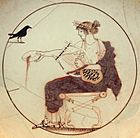 |
Apollo (pronounced: Ah-POLL-oh)
He is the god of light, healing, music, poetry, and prophecy. He is the son of Zeus and Leto. He is also the twin brother of Artemis. Apollo was linked to the Sun, while Artemis was linked to the Moon. Both of them use a bow and arrow. In old stories, Apollo sometimes argued with his half-brother Hermes. In art, Apollo is shown as a handsome young man with long hair and a perfect body. His special items are the laurel wreath and the lyre (a small harp). He often appears with the Muses. Animals special to Apollo include roe deer, swans, ravens, and snakes. |
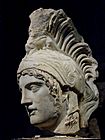 |
Ares (pronounced: AIR-eez)
He is the god of war and bloodshed. He was the son of Zeus and Hera. He was shown as a young, armed warrior. Ares usually stands for the wild side of war. This is different from Athena, who stands for smart strategies and skill in battle. Ares' special animals are the vulture, venomous snakes, dogs, and boars. The Roman name for Ares is Mars. Image: A Roman marble head of the war god, based on an old Greek statue |
 |
Artemis (pronounced: AR-teh-miss)
She is the goddess of hunting, wilderness, animals, and childbirth. Later, she also became linked to the Moon. She is the daughter of Zeus and Leto, and the twin sister of Apollo. She is shown as a young, virgin woman. In art, she often holds a hunting bow and arrows. Her special items include hunting spears and animal furs. Her special animals are deer, bears, and wild boars. The Roman name for Artemis is Diana. Image: Artemis reaching for an arrow (which is now missing) from her quiver, with a hunting dog beside her |
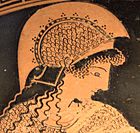 |
Athena (pronounced: Ah-THEE-nah)
She is the goddess of wisdom and skill, warfare, and tactics. Most stories say she was born from Zeus's head, fully grown and wearing armor! She was shown with a helmet, holding a shield and a spear. She also wore the Aegis over a long dress. Poets said she had very bright, sharp eyes. She was a special protector of heroes like Odysseus. She was also the protector of the city Athens, which is named after her. Her symbol is the olive tree. She is often seen with her special animal, the owl. The Roman name for Athena is Minerva. Image: Athena on a red-figure cup, made around 500–490 BCE |
 |
Demeter (pronounced: Dee-MEE-ter)
She is the goddess of farming, the harvest, and fertility. Demeter is a daughter of Cronus and Rhea. Her brother is Zeus, and together they had Persephone. She was an important goddess in the Eleusinian Mysteries. She was shown as an older woman, often wearing a crown and holding bunches of wheat. Her symbols are the cornucopia (horn of plenty), wheat-ears, and the lotus staff. Her special animals are pigs and snakes. The Roman name for Demeter is Ceres. Image: Demeter, sitting down, on a carving from Turkey |
| Dionysus (pronounced: Dye-oh-NY-sus)
He is the god of wine, parties, festivals, and sometimes madness. In art, he was shown as either an older man with a beard or a handsome young man with long hair. His special items include the thyrsus (a staff with a pinecone on top), a drinking cup, grape vines, and a crown of ivy. He is often seen with his thiasos, a group of followers including satyrs and maenads. His partner was Ariadne. Animals special to him include dolphins, snakes, and donkeys. Dionysus was added to the Olympians later. In some stories, he took Hestia's place. "Bacchus" was another name for him in Greek, and the Romans used this name for their version of the god. |
|
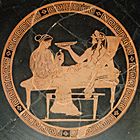 |
Hades (pronounced: HAY-deez)
He is the king of the underworld and god of the dead. His partner is Persephone. His special items are the cornucopia, a key, a sceptre, and the three-headed dog Cerberus. The owl was also special to him. He was one of three sons of Cronus and Rhea. He ruled one of the three parts of the universe: the underworld. He is not often included as one of the Olympians. In Athens, "Ploutōn" (meaning "wealthy one") was his preferred name, while "Hades" was more common for the underworld itself. The Romans called their version of Hades, Pluto. Image: Hades lying down, holding a giant drinking horn and offering a bowl to Persephone |
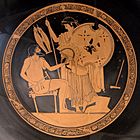 |
Hephaestus (pronounced: He-FES-tus)
He is the god of fire, metalworking, and crafts. He was the son of Hera, born without a father. He is the blacksmith of the gods and the husband of Aphrodite. He was usually shown as a bearded man with a hammer, tongs, and an anvil (tools of a smith). Sometimes he rode a donkey. His special animals are the donkey, the guard dog, and the crane. One of his many amazing creations was the armor of Achilles. Hephaestus used fire to create things. The Roman version, Vulcan, was also linked to volcanoes. Image: Thetis receives the armor made for her son Achilles by Hephaestus |
 |
Hera (pronounced: HEH-rah)
She is the Queen of the heavens and goddess of marriage, women, and birth. She is the wife of Zeus and daughter of Cronus and Rhea. She was usually shown as a royal woman, wearing a crown and veil, and holding a lotus-tipped staff. Even though she was the goddess of marriage, Zeus's many affairs often made her feel jealousy and anger. Her special animals are the heifer, the peacock, and the cuckoo. The Roman name for Hera is Juno. Image: Bust of Hera wearing a crown |
 |
Hermes (pronounced: HER-meez)
He is the god of travel, herding, writing, trade, and more. He is the son of Zeus and Maia. Hermes is the messenger of the gods. He also guides the souls of the dead to the afterlife. He was shown either as a handsome and fit young man or as an older bearded man. He often wore sandals with small wings on them. His special animals are the tortoise, the ram, and the hawk. The Roman name for Hermes is Mercury. Image: Hermes holding his caduceus (a winged staff) and wearing a cloak and hat for travel |
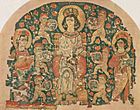 |
Hestia (pronounced: HES-tee-ah)
She is the goddess of the hearth (fireplace), home, and chastity. She is a daughter of Rhea and Cronus, and sister of Zeus. It was often hard to spot her in Greek art. She usually appeared as a veiled woman. Her symbols are the hearth and kettle. In some stories, she gave up her place as one of the Twelve Olympians for Dionysus. She plays a smaller role in Greek myths. However, the Roman version of Hestia, Vesta, was a very important goddess in Roman culture. Image: Hestia from a carving showing all twelve Olympians in a parade |
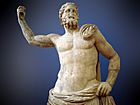 |
Poseidon (pronounced: Poh-SY-dun)
He is the god of the sea, rivers, floods, droughts, earthquakes, and he created horses. He is a son of Cronus and Rhea, and brother to Zeus and Hades. He rules one of the three parts of the universe as king of the sea and all waters. In old artwork, he was shown as an older man with a very large beard, holding a trident (a three-pronged spear). The horse and the dolphin are special to him. His wife is Amphitrite. The Roman name for Poseidon is Neptune. Image: Sculpture of Poseidon, from the National Archaeological Museum of Athens |
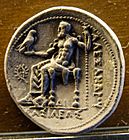 |
Zeus (pronounced: ZOO-s)
He is the King of the gods and ruler of Mount Olympus. He is the god of the sky, thunder, and lightning, law and order, and fate. He is the youngest son of Cronus and Rhea. He overthrew his father and took the throne of heaven for himself. In artwork, he was shown as a royal, older man with a dark beard. His usual special items are the royal sceptre and the lightning bolt. His special animals are the eagle and the bull. The Roman name for Zeus, Jupiter, was also the main god of the Romans. Image: A coin made under Alexander the Great showing Zeus on his throne holding a sceptre and eagle. |
Primordial Deities: The First Beings
The primordial deities are the very first beings that ever existed. They are what makes up the universe itself. All other gods came from them. The first among them is usually said to be Chaos. Chaos is the nothingness from which everything else was made. These gods are often shown as a place or a part of the world. For example, Tartarus is the deepest pit in the underworld. His brother Erebus is a place of darkness or the emptiness of space. Gaia is the Earth itself. Pontus is the oceans, lakes, and rivers. Chronos is time.
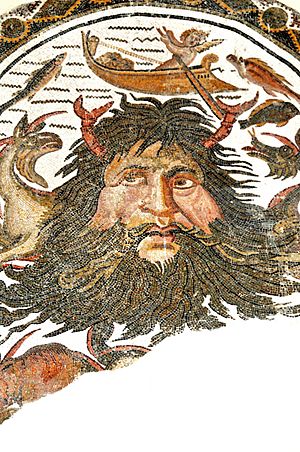
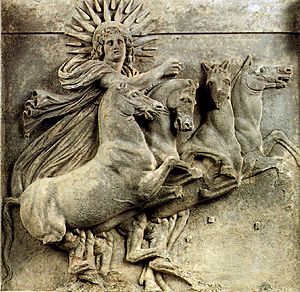
| Ancient Greek name | English name | What they are known for |
|---|---|---|
| Αἰθήρ (Aithḗr) | Aether | The god of the upper air and light. |
| Χάος (Cháos) | Chaos | The nothingness from which everything else came. Described as a void. |
| Χρόνος (Chrónos) | Chronos | The god of time. Not to be confused with the Titan Cronus, the father of Zeus. |
| Ἔρεβος (Érebos) | Erebus | The god of darkness and shadow. |
| Ἔρως (Eros) | Eros | The god of love and attraction. |
| Γαῖα (Gaîa) | Gaia | Goddess of the Earth (Mother Earth); mother of the Titans. |
| Ἡμέρα (Hēméra) | Hemera | Goddess of daylight. |
| Ὕπνος ("Hypnos") | Hypnos | God of sleep. |
| Νύξ (Nýx) | Nyx | The goddess of the night. |
| Οὐρανός (Ouranós) | Uranus | The god of the heavens (Father Sky); father of the Titans. |
| Πόντος (Póntos) | Pontus | The god of the sea, father of the fish and other sea creatures. |
| Τάρταρος (Tártaros) | Tartarus | God of the deepest, darkest part of the underworld. |
| Θάλασσα (Thálassa) | Thalassa | Spirit of the sea and partner of Pontos. |
| Θάνατος ("Thánatos") | Thanatos | God of death. Brother to Hypnos (sleep). |
Titans: The Older Gods
The Titans are an older group of gods in Greek mythology. The first Twelve Titans were children of Gaia (Mother Earth) and Uranus (Father Sky). Their leader was Cronus. He overthrew his father Uranus and became the ruler of the gods. Cronus' partner was his sister Rhea. Their children were Zeus, Hades, Poseidon, Hera, Demeter, and Hestia. Cronus and the Titans were later overthrown by Zeus, his youngest son. They fought a big war called the Titanomachy. The Titans are not shown in Greek art as often as the Olympians.
| Greek name | English name | What they are known for |
|---|---|---|
| The Twelve Main Titans | ||
| Ὑπερίων (Hyperíōn) | Hyperion | Titan of light. With Theia, he is the father of Helios (the sun), Selene (the moon), and Eos (the dawn). |
| Ἰαπετός (Iapetós) | Iapetus | Titan of mortality. He is the father of Prometheus and Atlas. |
| Κοῖος (Koîos) | Coeus | Titan of intelligence. |
| Κρεῖος (Kreîos) | Crius | Father of Astraeus. Not much is known about him. |
| Κρόνος (Crónos) | Kronos | The leader of the Titans. He overthrew his father Uranus. Later, his own son, Zeus, overthrew him. Not to be confused with Chronos, the god of time. |
| Mνημοσύνη (Mnēmosýnē) | Mnemosyne | Titan of memory. She is the mother of the Nine Muses. |
| Ὠκεανός (Ōceanós) | Oceanus | Titan of the ocean, the great river that flows around the earth. |
| Φοίβη (Phoíbē) | Phoebe | Titan of prophecy. She was Coeus' partner. |
| Ῥέα (Rhéa) | Rhea | Titan of fertility and mothers. She is the sister and partner of Cronus. She is the mother of Zeus, Hades, Poseidon, Hera, Demeter, and Hestia. |
| Τηθύς (Tēthýs) | Tethys | Wife of Oceanus. She is the mother of the rivers, fountains, and clouds. |
| Θεία (Theía) | Theia | Titan of sight and the light of the sky. She is Hyperion's partner. She is the mother of Helios, Selene, and Eos. |
| Θέμις (Thémis) | Themis | Titan of divine law and order. |
| Other Important Titans | ||
| Ἄτλας (Átlas) | Atlas | A Titan who was forced to carry the sky on his shoulders by Zeus. He was the son of Iapetus. |
| Ἠώς (Ēṓs) | Eos | Titan of the dawn. |
| Ἐπιμηθεύς (Epimētheús) | Epimetheus | Titan of afterthought. |
| Ἥλιος (Hḗlios) | Helios | Titan of the sun and guardian of oaths. |
| Λητώ (Lētṓ) | Leto | Titan of motherhood. She is the mother of the twins Artemis and Apollo. |
| Μῆτις (Mē̂tis) | Metis | Titan of wisdom, advice, and cleverness. |
| Προμηθεύς (Promētheús) | Prometheus | Titan of forethought and craftiness. He is known as the creator of humans. |
| Σελήνη (Selḗnē) | Selene | Titan of the moon. |
Giants: Huge and Powerful Beings
The Giants (pronounced: GEE-gan-teez) were the children of Gaia. After the Titans lost their war against the Olympians, Gaia made the Giants rise up. She wanted them to fight the Olympians and bring back the Titans' rule. The Olympians got help from the hero Heracles to stop the Giants. This big war was called the Gigantomachy.
- The Hekatonkheires (pronounced: Heh-kah-TON-khee-reez), the Hundred-Handed Ones. These were three giant gods of violent storms. They were sons of Uranus and Gaia.
- Briareus (pronounced: Bry-AH-ree-us) or Aigaion (pronounced: Ay-GAY-on), the Vigorous
- Cottus (pronounced: KOT-tus), the Furious
- Gyges (pronounced: GY-jeez), the Big-Limbed
- Alcyoneus (pronounced: Al-SY-oh-noos), the oldest of the Thracian giants. Heracles killed him.
- Aloadae (pronounced: Ah-LOH-ah-day), twin giants who tried to break into heaven.
- Otos (pronounced: OH-tos)
- Ephialtes (pronounced: Ef-ee-AL-teez)
- Antaeus (pronounced: An-TAY-us), a giant from Libya. He would wrestle visitors to death. Heracles killed him.
- Argus Panoptes (pronounced: AR-gus Pan-OP-teez), a hundred-eyed giant who watched over Io.
- Cyclopes (Elder), three one-eyed giants who made Zeus's lightning-bolts.
- Arges (pronounced: AR-jeez)
- Brontes (pronounced: BRON-teez)
- Steropes (pronounced: STEH-roh-peez)
- Cyclopes (Younger), a group of one-eyed, man-eating giants who herded sheep on the island of Sicily.
- Polyphemus (pronounced: Pol-ee-FEE-mus), a cyclops who captured Odysseus and his men. Odysseus then blinded him.
- Enceladus (pronounced: En-SEH-lah-dus), one of the Thracian giants who fought against the gods.
- Geryon (pronounced: JEH-ree-on), a giant with three bodies and four wings.
- The Laestrygonians (pronounced: Lays-try-GOH-nee-ans), a group of man-eating giants that Odysseus met.
- Orion (pronounced: Oh-RY-on), a giant huntsman. Zeus placed him among the stars as the constellation of Orion.
- Porphyrion (pronounced: Por-FEER-ee-on), the king of the Thracian Giants. Heracles and Zeus killed him with arrows and lightning-bolts.
- Talos (pronounced: TAH-los), a giant made of bronze by Hephaestus. Zeus gave him to his lover Europa to be her bodyguard.
- Typhon (pronounced: TY-fon), a huge storm-giant who was defeated and trapped in Tartarus.
Spirits and Personified Concepts
These are spirits or gods who represent ideas, feelings, or parts of life.
- Achlys (pronounced: AK-lees), spirit of misery and sadness.
- Adikia (pronounced: Ah-dee-KEE-ah), spirit of injustice.
- Aergia (pronounced: Ah-ER-jee-ah), spirit of laziness.
- Aidos (pronounced: AY-dos), spirit of modesty and respect.
- Aletheia (pronounced: Ah-lay-THEE-ah), spirit of truth.
- The Algea (pronounced: AL-jee-ah), spirits of pain and suffering.
- Apate (pronounced: Ah-PAH-tee), spirit of deceit.
- Arete (pronounced: Ah-reh-TAY), spirit of virtue and goodness.
- Atë (pronounced: AH-tee), spirit of mischief and ruin.
- Bia (pronounced: BEE-ah), spirit of force, power, and strength.
- Deimos (pronounced: DY-mos), spirit of fear.
- Dike (pronounced: DEE-kay), spirit of rights and fair judgment.
- Dolos (pronounced: DOH-los), spirit of tricks and deception.
- Eirene (pronounced: Eye-REE-nee), goddess of peace.
- Eleos (pronounced: EH-leh-os), spirit of mercy and pity.
- Elpis (pronounced: EL-pis), spirit of hope.
- Eris (pronounced: EH-ris), spirit of arguments and conflict.
- The Erotes (pronounced: Eh-ROH-teez), gods of love.
- Eros (pronounced: EH-ros), god of love.
- Eucleia (pronounced: Yoo-KLY-ah), spirit of glory.
- Eunomia (pronounced: Yoo-NOH-mee-ah), goddess of good law and order.
- Gelos (pronounced: GEH-los), spirit of laughter.
- Geras (pronounced: GEH-ras), spirit of old age.
- Harmonia (pronounced: Har-MOH-nee-ah), goddess of harmony.
- Hebe (pronounced: HEE-bee), goddess of youth.
- Hedone (pronounced: Heh-DOH-nee), spirit of pleasure and fun.
- Hypnos (pronounced: HIP-nos), god of sleep.
- Kratos (pronounced: KRAH-tos), spirit of strength and power.
- Lethe (pronounced: LEE-thee), spirit of forgetfulness.
- Lyssa (pronounced: LIS-sah), spirit of rage.
- The Moirai (pronounced: MOY-ry), or "Fates." They controlled everyone's life.
- Momus (pronounced: MOH-mus), spirit of mockery and criticism.
- Moros (pronounced: MOH-ros), spirit of doom.
- Nemesis (pronounced: NEH-meh-sis), goddess of revenge.
- Nike (pronounced: NY-kee), goddess of victory.
- Nyx (pronounced: NIX), the goddess of the night.
- Oizys (pronounced: Oy-ZIS), spirit of sadness.
- The Oneiroi (pronounced: Oh-NY-roy), spirits of dreams.
- Morpheus (pronounced: MOR-fee-us), god of dreams who takes human shapes.
- Peitho (pronounced: PY-thoh), spirit of persuasion.
- Penia (pronounced: PEH-nee-ah), spirit of poverty.
- Pheme (pronounced: FEE-mee), spirit of rumors and gossip.
- Phobos (pronounced: FOH-bos), spirit of panic and fear.
- Pistis (pronounced: PIS-tis), spirit of trust.
- Polemos (pronounced: POH-leh-mos), personification of war.
- Ponos (pronounced: POH-nos), spirit of hard labor.
- Sophrosyne (pronounced: Soh-FROH-sy-nee), spirit of self-control.
- Thanatos (pronounced: THAH-nah-tos), spirit of death.
- Tyche (pronounced: TY-kee), goddess of luck and chance.
- Zelos (pronounced: ZEE-los), spirit of rivalry and devotion.
Underworld Deities: Rulers of the Dead
These gods and spirits lived in the underworld. The ruler of the underworld was Hades, who is listed above under "Olympians".
- Cerberus (pronounced: SER-ber-us), the three-headed dog who guarded the gates of Hades.
- Charon (pronounced: KAR-on), the ferryman of Hades. He took the souls of the dead across the river.
- Erebos (pronounced: EH-reh-bos), the ancient god of darkness. His mists surrounded the underworld.
- The Erinyes (pronounced: Eh-RIN-ee-eez), also called the Furies. They were goddesses of punishment.
- Alecto (pronounced: Ah-LEK-toh), the unceasing one.
- Tisiphone (pronounced: TIS-ih-foh-nee), avenger of murder.
- Megaera (pronounced: Meh-GAY-rah), the jealous one.
- Hecate (pronounced: HEK-ah-tee), goddess of magic, witchcraft, the night, and ghosts.
- Judges of the Dead: These three kings judged the souls of the dead.
- Persephone (pronounced: Per-SEF-oh-nee), queen of the underworld. She is the wife of Hades and goddess of spring.
- Rivers of the Underworld:
- Acheron (pronounced: AK-eh-ron), the river of pain.
- Kokytos (pronounced: Koh-KY-tos), the river of crying.
- Lethe (pronounced: LEE-thee), the river of forgetfulness.
- Phlegethon (pronounced: FLEH-geh-thon), the river of fire.
- Styx (pronounced: STIX), the river of oaths.
- Tartarus (pronounced: TAR-tah-rus), the ancient god of the darkest pit of Hades.
- Thanatos (pronounced: THAH-nah-tos), spirit of death and Hades' helper.
Sea Deities: Gods of the Waters
- Amphitrite (pronounced: Am-fih-TRY-tee), sea goddess and partner of Poseidon.
- Ceto (pronounced: SEE-toh), goddess of ocean dangers and sea monsters.
- Charybdis (pronounced: Kah-RIB-dis), a sea monster and spirit of whirlpools.
- Glaucus (pronounced: GLAW-kus), a god of fishermen and sailors.
- Gorgons (pronounced: GOR-gonz), three monstrous sea spirits.
- Medusa (pronounced: Meh-DOO-sah)
- The Graeae (pronounced: GRAY-ee), three ancient sea spirits who shared one eye and one tooth.
- The Harpies (pronounced: HAR-peez), winged spirits linked to sudden winds.
- Leucothea (pronounced: Loo-koh-THEE-ah), a sea goddess who helped sailors in trouble.
- Nereides (pronounced: NEH-ree-ids), sea nymphs.
- Thetis (pronounced: THEH-tis), leader of the Nereids.
- Nereus (pronounced: NEH-ree-us), the old man of the sea and god of fish.
- Oceanus (pronounced: Oh-SEE-ah-nus), Titan god of the great river that flows around the Earth.
- Palaemon (pronounced: Pah-LAY-mon), a young sea god who helped sailors.
- Pontos (pronounced: PON-tos), ancient god of the sea, father of fish.
- Poseidon (pronounced: Poh-SY-dun), king of the sea and leader of the sea gods.
- Proteus (pronounced: PROH-tee-us), a sea god who could change shape. He herded Poseidon's seals.
- Scylla (pronounced: SKIL-lah), a monstrous sea goddess.
- The Sirens (pronounced: SY-renz), sea nymphs who lured sailors to their death with their beautiful songs.
- Tethys (pronounced: TEH-this), wife of Oceanus, and mother of rivers.
- Thalassa (pronounced: THAH-lah-sah), ancient spirit of the sea.
- Triton (pronounced: TRY-ton), son and messenger of Poseidon. He had the body of a man and the tail of a fish.
Sky Deities: Gods of the Heavens
- Aeolus (pronounced: Ay-OH-lus), god of the winds.
- Aether (pronounced: EE-ther), ancient god of the upper air and light.
- Anemoi, gods of the winds.
- Apollo, god of the sun and light.
- Astraios (pronounced: As-TRAY-os), Titan god of stars and planets.
- Aurai (pronounced: AW-ry), nymphs of the cool breeze.
- Chaos (pronounced: KAY-os), represented the lower atmosphere around the earth.
- Chione (pronounced: KY-oh-nee), goddess of snow.
- Helios (pronounced: HEE-lee-os), Titan god of the sun.
- Selene (pronounced: Seh-LEE-nee), Titan goddess of the moon.
- Eos (pronounced: EE-os), Titan goddess of the dawn.
- Hemera (pronounced: HEH-meh-rah), ancient goddess of daylight.
- Hera (pronounced: HEH-rah), queen of heaven and goddess of the air and stars.
- Iris (pronounced: EYE-ris), goddess of the rainbow and a messenger of the gods.
- Nephelai (pronounced: Neh-FEH-ly), cloud nymphs.
- Ouranos (pronounced: Oo-RAH-nos), ancient god of the heavens.
- The Pleiades (pronounced: PLY-ah-deez), goddesses of the stars named after them.
- Zeus (pronounced: ZOO-s), king of heaven and god of the sky, thunder, and lightning.
Rustic Deities: Gods of Nature and the Countryside
- Aetna (pronounced: ET-nah), goddess of Mount Etna, a volcano.
- Anthousai (pronounced: An-THOO-sy), flower nymphs.
- Aristaeus (pronounced: Ah-ris-TAY-us), god of bee-keeping, cheese-making, and hunting.
- Centaurs (pronounced: SEN-tawrz), half-man, half-horse beings.
- Chiron (pronounced: KY-ron), the wisest of the centaurs.
- Chloris (pronounced: KLOR-is), goddess of flowers.
- Comus (pronounced: KOH-mus), god of celebrating and partying.
- Cybele (pronounced: SIB-eh-lee), a goddess of mountains and nature.
- Dionysus (pronounced: Dye-oh-NY-sus), god of wine and wild plants.
- Dryades (pronounced: DRY-ads), tree and forest nymphs.
- Epimeliades (pronounced: Eh-pih-MEH-lee-ads), nymphs who protected sheep.
- Gaia (pronounced: GAY-ah), ancient goddess of the earth.
- Hamadryades (pronounced: Ham-ah-DRY-ads), oak tree dryades.
- Hephaestus (pronounced: He-FES-tus), god of metalworking.
- Hermes (pronounced: HER-meez), god of roads and herds.
- The Horae (pronounced: HOH-ry), the Hours. They were goddesses of law, nature, and times of day.
- Maenades (pronounced: MY-nads), wild nymphs who followed Dionysus.
- Meliae (pronounced: MEH-lee-ay), nymphs of honey and the ash tree.
- Naiades (pronounced: NY-ads), freshwater nymphs.
- Oreades (pronounced: OH-ree-ads), mountain nymphs.
- Echo (pronounced: EK-oh), a nymph cursed to only repeat words.
- Oceanides (pronounced: Oh-SEE-ah-nids), freshwater nymphs.
- The Ourea (pronounced: OO-ree-ah), ancient gods of mountains.
- Pan (pronounced: PAN), god of shepherds, pastures, and fertility.
- The Potamoi, river gods.
- Achelous (pronounced: Ak-eh-LOH-us), greatest of the river gods.
- Styx (pronounced: STIX), the river of oaths.
- Priapus (pronounced: Pry-AY-pus), god of fertility and gardens.
- Rhea (pronounced: REE-ah), the great mother and queen of the mountain wilderness.
- Satyrs (pronounced: SAY-terz), fertility spirits, often half-man, half-goat.
- Silenus (pronounced: Sy-LEE-nus), an old god of dance and wine.
Agricultural Deities: Gods of Farming and Harvest
- Adonis (pronounced: Ah-DOH-nis), a god of life, death, and rebirth.
- Demeter (pronounced: Dee-MEE-ter), goddess of fertility, agriculture, and harvest.
- Dionysus (pronounced: Dye-oh-NY-sus), god of wine and growing grapes.
- Hestia (pronounced: HES-tee-ah), goddess of the hearth and baking bread.
- Persephone (pronounced: Per-SEF-oh-nee), queen of the underworld and goddess of spring growth.
- Plutus (pronounced: PLOO-tus), god of wealth, including farm wealth. He is Demeter's son.
Deified Mortals: Humans Who Became Gods
These were people who were once mortal but became immortal gods or goddesses after their death.
- Achilles (pronounced: Ah-KIL-eez), the hero of the Trojan War.
- Aiakos (pronounced: Eye-AH-kos), a king who became a Judge of the Dead in the underworld.
- Aeolus (pronounced: Ay-OH-lus), a king who became the immortal king of the winds.
- Ariadne (pronounced: Ah-ree-AD-nee), a princess who became the immortal wife of Dionysus.
- Asclepius (pronounced: As-KLEE-pee-us), a healer who became a god of healing. Zeus later placed him in the sky as the Ophiuchus constellation.
- The Dioscuri (pronounced: Dy-OS-koo-ry), divine twins.
- Castor (pronounced: KAS-tor)
- Pollux (pronounced: POL-luks)
- Ganymede (pronounced: GAN-ih-meed), a handsome prince kidnapped by Zeus to be the cup-bearer of the gods.
- Glaucus (pronounced: GLAW-kus), a fisherman who became immortal after eating a magical herb.
- Heracles (pronounced: HEH-rah-kleez), a divine hero, famous for his strength.
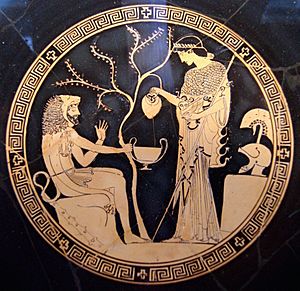
Health Deities: Gods of Healing and Well-being
Other Deities: Various Gods and Spirits
- Astraea (pronounced: As-TRAY-ah), virgin goddess of justice.
- Charites (pronounced: KAR-ih-teez), goddesses of charm, beauty, and creativity.
-
- Aglaea (pronounced: Ah-GLY-ah), goddess of beauty.
- Euphrosyne (pronounced: Yoo-FROH-sy-nee), goddess of joy.
- Thalia (pronounced: THAH-lee-ah), goddess of celebrations.
- Circe (pronounced: SUR-see), a minor goddess of magic and a witch.
- Eileithyia (pronounced: Eye-ly-THY-ah), goddess of childbirth.
- Enyo (pronounced: Eh-NY-oh), goddess of destructive war.
- Hermaphroditus (pronounced: Her-MAF-roh-DY-tus), god of hermaphrodites.
- Hymenaios (pronounced: Hy-men-AY-os), god of marriage feasts.
- Muses (pronounced: MYOO-zez), goddesses of music, song, dance, and inspiration for poets.
- Olympian Muses, daughters of Zeus and Mnemosyne:
- Calliope (pronounced: Kah-LY-oh-pee), muse of epic poetry.
- Clio (pronounced: KLY-oh), muse of history.
- Euterpe (pronounced: Yoo-TER-pee), muse of lyric poetry.
- Melpomene (pronounced: Mel-POM-eh-nee), muse of tragedy.
- Polyhymnia (pronounced: Pol-ee-HIM-nee-ah), muse of sacred poetry.
- Terpsichore (pronounced: Terp-SIK-oh-ree), muse of dance.
- Thalia (pronounced: THAH-lee-ah), muse of comedy.
- Urania (pronounced: Yoo-RAY-nee-ah), muse of astronomy.
- Olympian Muses, daughters of Zeus and Mnemosyne:
- Palaestra (pronounced: Pah-LY-strah), goddess of wrestling.
Mortals
Heroes: Brave and Famous People
- Achilles (pronounced: Ah-KIL-eez), a main hero of the Trojan War.
- Aeneas (pronounced: Eh-NEE-as), a Trojan War hero and ancestor of the Roman people.
- Ajax the Great (pronounced: AY-jaks), a strong hero of the Trojan War.
- Bellerophon (pronounced: Beh-LEH-roh-fon), a hero who killed the Chimera.
- Daedalus (pronounced: DEH-dah-lus), a great inventor who built the labyrinth.
- Diomedes (pronounced: Dy-oh-MEE-deez), a king and hero of the Trojan War.
- Hector (pronounced: HEK-tor), the main hero and champion of the Trojans in the Trojan War.
- Jason (pronounced: JAY-son), the leader of the Argonauts.
- Meleager (pronounced: Mel-ee-AH-ger), a hero who sailed with the Argonauts.
- Odysseus (pronounced: Oh-DIS-ee-us), a hero and king of Ithaca. His long journey home is told in Homer's Odyssey.
- Orpheus (pronounced: OR-fee-us), a legendary musician and poet.
- Perseus (pronounced: PER-see-us), the first king of Mycenae and son of Zeus. He killed Medusa.
- Theseus (pronounced: THEE-see-us), son of Poseidon and a king of Athens. He killed the Minotaur.
Notable Women: Important Female Figures
- Alcestis (pronounced: Al-SES-tis), known for being very devoted to her husband.
- Andromache (pronounced: An-DROH-mah-kee), wife of Hector.
- Andromeda (pronounced: An-DROM-eh-dah), wife of Perseus. She was placed among the stars after her death.
- Antigone (pronounced: An-TIG-oh-nee), daughter of Oedipus.
- Arachne (pronounced: Ah-RAK-nee), a skilled weaver turned into a spider by Athena.
- Ariadne (pronounced: Ah-ree-AD-nee), daughter of King Minos. She helped Theseus and became Dionysus' wife.
- Atalanta (pronounced: At-ah-LAN-tah), a heroine who joined the Calydonian Boar hunt.
- Cassandra (pronounced: Kah-SAN-drah), a princess of Troy who could see the future, but no one believed her.
- Clytemnestra (pronounced: Kly-tem-NES-trah), sister of Helen and wife of Agamemnon.
- Danaë (pronounced: DAN-ay-ee), the mother of Perseus by Zeus.
- Deianeira (pronounced: Day-ah-NY-rah), the second wife of Heracles.
- Helen (pronounced: HEH-len), daughter of Zeus and Leda. Her kidnapping caused the Trojan War.
- Iphigenia (pronounced: If-ih-jeh-NY-ah), daughter of Agamemnon.
- Jocasta (pronounced: Joh-KAS-tah), mother and wife of Oedipus.
- Medea (pronounced: Meh-DEE-ah), a sorceress and wife of Jason.
- Medusa (pronounced: Meh-DOO-sah), a mortal woman turned into a monster by Athena.
- Pandora (pronounced: Pan-DOR-ah), the first woman.
- Penelope (pronounced: Peh-NEL-oh-pee), loyal wife of Odysseus.
- Semele (pronounced: SEM-eh-lee), mortal mother of Dionysus.
Kings: Rulers of Ancient Lands
- Agamemnon (pronounced: Ag-ah-MEM-non), king of Mycenae and leader of the Greek armies in the Trojan War.
- Cadmus (pronounced: KAD-mus), the first king of Thebes.
- Creon (pronounced: KREE-on), a king of Thebes.
- Danaus (pronounced: DAN-ay-us), a king of Egypt.
- Dardanus (pronounced: DAR-dah-nus), the first king of Dardania, son of Zeus.
- Jason (pronounced: JAY-son), the leader of the Argonauts.
- Menelaus (pronounced: Men-eh-LAY-us), king of Sparta and husband of Helen.
- Midas (pronounced: MY-das), a king who could turn anything to gold with his touch.
- Minos (pronounced: MY-nos), a king of Crete. After his death, he became a judge of the dead.
- Nestor (pronounced: NES-tor), a wise king of Pylos.
- Odysseus (pronounced: Oh-DIS-ee-us), a hero and king of Ithaca.
- Oedipus (pronounced: EE-dih-pus), a king of Thebes.
- Peleus (pronounced: PEE-lee-us), king of the Myrmidons and father of Achilles.
- Pelias (pronounced: PEH-lee-as), a king who took the throne from Jason's father.
- Pentheus (pronounced: PEN-thee-us), a king of Thebes who banned Dionysus worship.
- Perseus (pronounced: PER-see-us), first king of Mycenae.
- Priam (pronounced: PRY-am), king of Troy during the Trojan War.
- Sisyphus (pronounced: SIS-ih-fus), a king who tried to cheat death. He was punished to forever roll a rock up a hill.
- Theseus (pronounced: THEE-see-us), a king of Athens. He killed the Minotaur.
Seers: People Who Saw the Future
Seers were prophets. They were people who could see the future or predict events before they happened.
- Calchas (pronounced: KAL-kas), a seer who helped the Greeks during the Trojan War.
- Cassandra (pronounced: Kah-SAN-drah), a princess of Troy who could see the future, but no one believed her.
- Helenus (pronounced: HEH-leh-nus), a seer and twin brother of Cassandra.
- Manto (pronounced: MAN-toh), a seer and daughter of Tiresias.
- Melampus (pronounced: Meh-LAM-pus), a legendary soothsayer and healer.
- Tiresias (pronounced: Ty-REE-see-as), a blind prophet of Thebes.
Amazons: Fierce Women Warriors
- Hippolyta (pronounced: Hip-POL-ih-tah), a daughter of Ares and queen of the Amazons.
- Melanippe (pronounced: Mel-ah-NIP-ee), a daughter of Ares and sister of Hippolyta.
- Myrina (pronounced: My-REE-nah), a queen of the Amazons.
- Penthesilea (pronounced: Pen-theh-sih-LEE-ah), a queen of the Amazons who fought in the Trojan War.
Inmates of Tartarus: Punished Souls
These are famous figures who were punished in Tartarus, the deepest part of the underworld.
- The Danaides (pronounced: Dah-NY-ih-deez), forty-nine daughters who murdered their husbands. They were punished by having to carry water in leaking jugs forever.
- Sisyphus (pronounced: SIS-ih-fus), a king who tried to cheat death. He was sentenced to forever roll a big rock up a hill, only for it to roll back down.
- Tantalus (pronounced: TAN-tah-lus), a king who killed his son and served him to the gods. He was punished with endless hunger and thirst; food and drink were always just out of his reach.
Images for kids
Related pages
See also
 In Spanish: Anexo:Figuras de la mitología griega para niños
In Spanish: Anexo:Figuras de la mitología griega para niños
 | Charles R. Drew |
 | Benjamin Banneker |
 | Jane C. Wright |
 | Roger Arliner Young |


